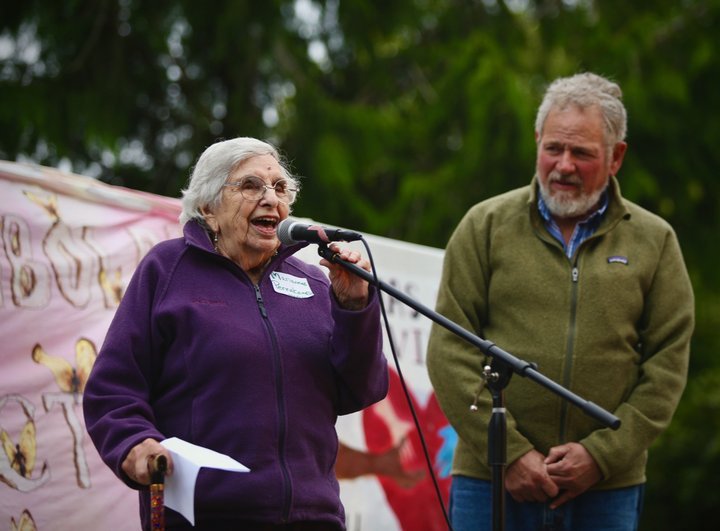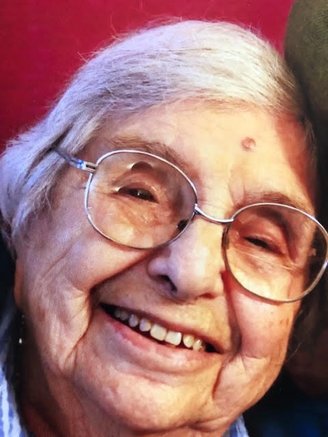
Marianne Pennekamp speaks at the ‘Lights for Liberty’ protest of detention camps on the southern US border. File photo: Andrew Goff.
###
Marianne Pennekamp died at 9:30 a.m. on Friday, December 3, 2021, in her little beloved home in Freshwater. She heard the hand-pulled brass school bell call the children to Garfield School for the last time that morning. Her life ended in the community she loved and lived in with joy, partially because it reminded her of her childhood in southern Germany before the Nazi terror.

Born in Karlsruhe, Germany in 1924, to parents Jules and Lilly (nee Loewenthal) Hockenheimer, Marianne lived a full and giving 97 years. Her younger brother Ralph, now 96, and recent inductee into the French Legion of Honor as Chevalier, pays tribute to their parents in his autobiographical book, Freedom is Not Free: … “ to my late parents… who bore the brunt of the terror of the Nazi years: my father, who went through jail and internment camps because he was a refugee and enemy alien in France; my mother who kept the family together regardless of the adversity of immigration and the War.”
Of the early years in Germany, Marianne always remembered the kindness around her. Her stories were of aunts who took her skiing or collecting wild strawberries in the Black Forest, and the German school teacher who took her aside to explain why she could not and should not want to carry the flag with the Swastika. The schoolteacher did all he could to protect the Jewish students.
As refugees in Marseille, the landlord stopped charging the family rent without saying a word during the years after her father, Jules, was imprisoned. There were many similar incidents after the defeat of France by Nazi Germany in 1940 and the family escape a year later, in 1941. Marianne was one of the top students in the girls’ school in Marseille. Education was her anchor and liberation during the difficult years when, among other things, hunger was frequent and the future dark. The rescue story is complex, however with the unbelievable assistance of the American Friends Service Committee (The Quakers) and Hiram Bingham, US Consul in Marseille, Marianne, and her family escaped France and were able to emigrate to America.
On May 14, 1941, Marianne turned 17 in the harbor of Casablanca on the fabled refugee ship, the S.S. Winnipeg. Flying the Vichy France flag, the Winnipeg was hijacked off the coast of Venezuela by the Free Dutch Navy in the mistaken belief that the Winnipeg transported “the enemy”. The family arriving in the British colony of Trinidad, now penniless, was sent money from family in the USA for passage on an ocean liner to NY. A film of that period, “Marianne: One Immigrants Journey”, by filmmakers Amy Uyeki and Joy Hardin is available online at Vimeo: https://vimeo.com/267052113. Password: Marianne.
In 1941 in New York, Marianne met Alfred “Henk” Pennekamp, a fellow refugee whose assumed name “Henk de Vries” was forged on passport and visa documents during his time with the German resistance in Holland. Despite a “mixed marriage”, Marianne Jewish and Henk raised Catholic, he 19 years her senior, he from a proud working-class unionist family and she from a middle-class business household, there was a deep sharing of human values and love for the old country, despite Hitler. They were united in their passion for democracy and horror of authoritarianism, whether fascist or communist. Theirs was a strong marriage. Marianne insisted on equality in all things, and Henk was a socialist who embraced equality as a way of life, first and foremost with his wife. No one was as proud or less threatened with her achievements than Henk, whose formal education ended in the eighth grade. They moved to Berkeley, California in 1945 for Marianne to attend graduate school at UC Berkeley. Marianne and Henk’s first child, Lynne, was born in October 1945. Shortly thereafter, the family moved back to bombed out France and Germany to find family and friends, returning to Oakland and Berkeley in 1950. Marianne described living in Europe immediately post war as the hardest years of her life.
Back at Berkeley, Marianne finished her MSW degree and began working at the Lincoln Child Care Center for special needs children. She and Henk had their second child, Peter, in 1952. Marianne moved to the Oakland Public Schools in 1956 as school social worker, where she worked for over 20 years while also receiving her PhD in School Social Work from UC Berkeley. She subsequently taught there. Marianne had been recruited by Janet McLeod of the Oakland Public Schools to join a group of powerful women working to empower children, parents, and communities, considered an environmental as opposed to case work approach to child guidance. This involved community organizing and school advocacy and daily confrontation with racism. Janet McLeod, Mary Alice Sarvis MD, Betty Davis Morrison, Bell Rainer and Helen Ausenbaum were among her close collaborators. She and Dr. Mary Sarvis coauthored the groundbreaking book, Collaboration in School Guidance published in 1970. Marianne authored and coauthored many more professional papers, and a second book, Social Work Practice: Toward a Child, Family, School, Community Perspective, with coauthor Edith M. Freeman.
The family had close ties to the Quakers since the rescue of Marianne’s family from Europe. In 1964, on the way to visit Argenta Friends School in British Columbia where she had recently graduated from High School, daughter Lynne was killed in a car crash. The loss of Lynne, after so much loss as refugees, was terrible for the family and proved almost fatal for Henk who suffered a series of major heart attacks and depression.
In 1981, upon the birth of Paul, their first grandchild, Marianne and Henk moved to Humboldt County in northern California to be close to their son Peter and family. Marianne fell in love with Humboldt, and contrary to family expectations that she would return to Berkeley when Henk died in January 1984, she stayed on, teaching in several departments at Humboldt State University, and volunteering with public schools, juvenile justice, and mental health services. She served on the Humboldt County Juvenile Justice Commission, The Behavioral Health Board, and served as board member and/or supported several NGO’s such as NAMI and the Betty Kwan Chinn Homeless Foundation. She was particularly committed to and instrumental in developing the Humboldt County Healthy Start Program, including at the state policy development level.
The day before and the morning of her death, Marianne spent time with her amazing caring and loving friends and neighbors, Annie Bolick-Floss and James Floss, Greg Colyar and Ute Ueker, her loving caregiver and relative, Rehema Tinkemanyira, her friend and caregiver, Pam Armstrong, her daughter of-the-heart, Marcy Foster, and her daughter-in-law, Denise Vanden Bos, and son, Peter Pennekamp. Her long-time extended family members, Tim and Penelope Haskett and Bruce and Leslie Silvey visited the day before. Special thanks to her friend, Michael Fratkin, M.D. who helped her and her son, Peter, prepare for the end of her life with acceptance and shared compassion.
Marianne was particularly proud of her grandsons’ Paul Pennekamp and partner Danielle, and Sean Pennekamp and wife Fatmah and their families. She utterly adored her great grandchildren, Micah, Juniper, and Adam. She had a very special connection with her “two peas in a pod” grand daughter-in-law, Fatmah, Sean’s wife from Uganda, who like Marianne is an immigrant raised under the threat of war. Her other survivors were immensely important to her: nephew Cliff and wife Julie Hockley, their children Ellen and Lilly and their families; niece Denise Hockley and her daughter Jess; niece Crystal Gottfried; great nephews Joachim and Michael Wipprecht and their families.
It is impossible to list all the important people in Marianne’s life, and the family hopes for their understanding. Marianne’s dear friend, Sue Y. Lee Mossman, helped with this writing.
There will be a future service to remember Marianne’s life and her contributions, hopefully this winter 2022, Covid willing. If you wish to make donations in Marianne’s memory, she had a deep devotion to organizations that help refugees; the American Friends Service Committee, Amnesty International, the International Rescue Committee, and Save the Children. She had deep connections to the Humboldt Unitarian Universalist Fellowship, and Temple Beth-El. We encourage donations to them, or any organization that serves children and families.
###
The obituary above was submitted on behalf of Marianne Pennekamp’s loved ones. The Lost Coast Outpost runs obituaries of Humboldt County residents at no charge. See guidelines here.
CLICK TO MANAGE